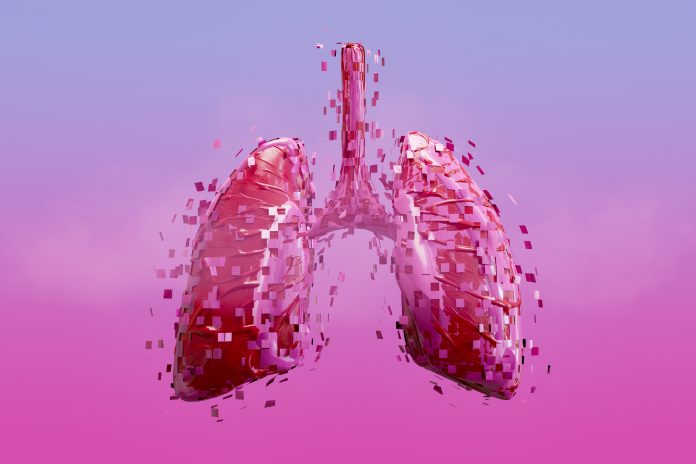Dr Samantha Walker, Director of Research and Innovation at Asthma + Lung UK, the leading lung charity, discusses the socioeconomic costs of lung conditions and the need for great lung health research
Every five minutes, someone in the UK dies from a lung condition like asthma, bronchitis and pneumonia. Currently, not enough is known about how lung conditions develop, how best to diagnose and treat them, or how to prevent someone’s condition from worsening.
Lung conditions present an unmet medical need
We know that people with poor lung health are some of the biggest losers in a National Health Service that buckled under a lack of funding and COVID-19, making the profound health inequalities linked to lung conditions even worse.
And what’s more, lack of diagnosis and proper treatment is heaping even more pressure on the NHS as people turn to A&E; lung conditions are the biggest driver of emergency admissions in winter.
Lord Darzi’s review of the state of the NHS will inform the government’s new NHS ten-year plan, but to really help turn around the NHS, lung disease must be treated with the same urgency as cancer and heart disease.
But while lung research remains chronically underfunded, the negative cycle of sickness and winter pressures won’t change. Lung conditions will keep killing more people in the UK than anywhere else in Europe. Lives will be cut short. More people will receive a devastating diagnosis that should have been prevented. Too many families, especially those most disadvantaged, will be robbed of precious moments together.
How do we achieve change?
The simple answer is by investing more money in research that will improve our understanding of the underlying causes of lung conditions and how they progress, as well as developing better, more accessible ways of diagnosing and treating lung conditions. Funding is also needed to harness twenty-first century technologies, currently available in our pockets – using the capabilities of our phones to keep people well, at work and out of hospital.
Labour has committed to turn the NHS on its head, by moving care from hospitals to the community, changing the focus on sickness to prevention, and moving the system from analogue to digital. A focus on research into cost-effective ways of preventing emergency hospital admissions and urgent ambulance callouts for asthma attacks and other life-threatening lung crises would not only help the government to meet this commitment. It would also drive economic growth and industry investment in the UK.
Despite being the third biggest killer in the UK, lung conditions currently only receive 2.5% of public investment spent on research
The Prime Minister has promised to remove red tape and ‘rip out the bureaucracy that blocks investment’ to get the economy growing again, and the recent partnership between the government and Lilly, the world’s largest pharmaceutical company, to combine the “world’s leading scientific minds, and a National Health Service with enormous potential” to “bring life-changing treatments closer to being a reality for NHS patients” shows this government’s interest in public and private partnerships.
It’s essential that the proportional impact of respiratory ill health is recognised in distributing this funding. Despite being the third biggest killer in the UK, lung conditions currently only receive 2.5% of public investment spent on research. This means that out of every 100 people, 20 will develop lung conditions, but there’s only enough funding for research that might save two.
As a result, too many people are dying from their lung disease or can’t live their life to its fullest with negative impacts on socialising, exercise, day-to-day tasks and work.
Each year, thousands of work hours are lost due to poor lung health and people are left too sick to work. Poor lung health costs the UK £188 billion every year when considering the healthcare costs of lung conditions and economic inactivity. This can be broken down into £9.6 billion in direct costs to the NHS, £4.2 billion in indirect costs associated with lost productivity from people requiring time off work, and £174.4 billion in wider societal costs, including premature death and ill health caused by lung conditions.
In the past twenty years there has been little improvement in diagnosing and treating lung conditions. It’s time to do things differently. This is why Asthma + Lung UK is working hard to challenge this long-standing underinvestment.
Hope on the horizon for lung health research
In February 2024 the charity became a founding member of Our Future Health (OFH), the world’s largest health research programme, which will bring together up to five million people to develop new ways to prevent, detect and treat diseases. This project, using people’s health data, will help scientists understand early development and progression of lung conditions, ultimately leading to better diagnosis, treatment and management. To find out more and take part in the study, you can sign up here: Join the research programme | Our Future Health.
Asthma + Lung UK has also convened a group of experts from charities, funders and academia to form the Lung Research and Innovation Group (LRIG) to help drive forward respiratory research with one voice. This group has outlined 10 priorities to accelerate respiratory research and innovation, highlighting key areas that could transform clinical care for people with lung conditions, help children return to school and adults to work.
In addition, the charity has partnered with HDR UK to fund a Respiratory Data Catalyst to link respiratory data in NHS health records and disease registries to drive a better understanding of lung conditions and how they develop. Connecting and analysing lung data will help us find new ways of treating and managing lung conditions so that we can effectively keep people well and out of hospital, particularly in the winter when the NHS comes under significant pressure. Without well connected data, it’s impossible to know the scale of the problem and what progress has been made.
In 2018 £46 million was invested in lung health research, this was 2% of the total public spend on research. Asthma + Lung UK has played a key role in increasing this to £70 million in 2022, a 40% increase in public funding over four years.
The charity is working hard to reverse decades-long underinvestment. Lung research breakthroughs can happen and when they do, they save lives. Treatments for asthma and chronic obstructive pulmonary disease (COPD) are available because of our funded research. But the gap between what is needed and what is available is far bigger than it should be. For the worst-off communities, this shameful, life-threatening gap is one we can’t afford to ignore.
What should additional increased investment be spent on?
Better diagnostic tools that are cheaper, less complicated to perform and interpret, less invasive and more accessible for more people, will enable intervention before lung damage becomes inevitable and irreversible. As well as improved understanding of the genetic and environmental factors that lead to lung conditions developing in the first place. All of which requires research.
New treatments are also urgently needed. Despite the promising news that Dupilumab, a monoclonal antibody therapy currently used to treat severe asthma, is expected to be approved soon in the UK for some people affected by uncontrolled COPD, there have been no successful new drug developments for COPD in more than 30 years.
Following years of dedicated research, there was also a huge leap forward in the treatment of bronchiectasis, an inflammatory disease that leads to chronic cough and frequent exacerbations, when Brensocatib, an oral tablet, was proven earlier this year to help people with the condition. The first-ever dedicated treatment for bronchiectasis, offering much-needed hope for those suffering from the disease.
However, the fact that some lung conditions are only just seeing their first really effective treatment demonstrates how desperately far behind the UK is on improving lung health.
Urgent action is needed to increase investment into lung research to give everyone fighting for breath a future. Your support will mean those living with a lung condition can lead a better, fuller life.
We all have a role to play as fundraisers, scientists, funders, campaigners and people affected by lung conditions. It’s time to properly fund lung research and make it easier for people to breathe. Our vision is a world where everyone has healthy lungs. Be part of making it happen.








